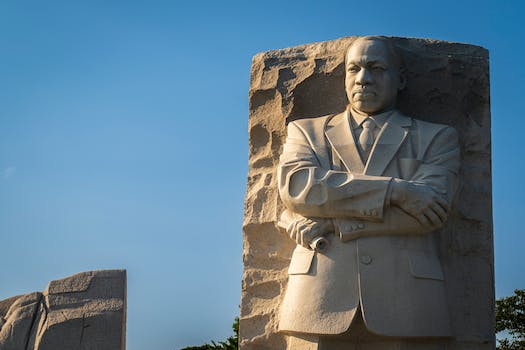-
Table of Contents
“Embrace criticism, rise above it, and let your actions speak louder than words.”
Introduction
Martin Luther King Jr., a prominent civil rights leader, faced immense criticism throughout his life as he fought for equality and justice. Despite the challenges, he offered valuable advice on how to handle criticism. King emphasized the importance of maintaining a strong sense of self-worth, responding with love and understanding, and using criticism as an opportunity for growth and self-improvement. His teachings continue to inspire individuals to navigate criticism with grace and resilience.
Overcoming Adversity: Martin Luther King Jr.’s Approach to Handling Criticism
Martin Luther King Jr. was a prominent figure in the civil rights movement, known for his powerful speeches and nonviolent approach to activism. Throughout his life, he faced intense criticism and opposition from those who disagreed with his message of equality and justice. However, King had a unique approach to handling criticism that can serve as a valuable lesson for all of us.
One of the key aspects of King’s approach was his unwavering commitment to nonviolence. He believed that responding to criticism with anger or aggression would only perpetuate the cycle of violence and hatred. Instead, he advocated for responding to criticism with love and understanding. King understood that by responding to hate with hate, we only deepen the divide between people. By responding with love, we have the power to bridge that divide and create meaningful change.
Another important aspect of King’s approach was his ability to see criticism as an opportunity for growth. He recognized that criticism, even when it is harsh or unfair, can provide valuable insights and perspectives. Rather than dismissing criticism or becoming defensive, King encouraged individuals to reflect on the validity of the criticism and use it as a catalyst for personal and collective growth. He believed that by embracing criticism, we can become better versions of ourselves and create a more just society.
In addition to his commitment to nonviolence and growth, King also emphasized the importance of staying true to one’s values and principles in the face of criticism. He understood that criticism often arises when individuals challenge the status quo and advocate for change. In these moments, it can be tempting to compromise one’s beliefs in order to appease critics. However, King believed that staying true to one’s values is essential for creating lasting change. He encouraged individuals to remain steadfast in their convictions, even when faced with intense criticism or opposition.
Furthermore, King recognized the power of empathy in handling criticism. He understood that behind every criticism is a person with their own experiences, fears, and insecurities. By seeking to understand the perspective of the critic, King believed that we can foster empathy and compassion, even in the face of harsh criticism. He encouraged individuals to listen to the concerns and grievances of their critics, and to respond with empathy and understanding. By doing so, King believed that we can build bridges of understanding and work towards a more inclusive and just society.
In conclusion, Martin Luther King Jr.’s approach to handling criticism offers valuable insights for all of us. By responding to criticism with love and understanding, embracing it as an opportunity for growth, staying true to our values, and practicing empathy, we can navigate criticism in a constructive and transformative way. King’s teachings remind us that criticism is not something to be feared or avoided, but rather an opportunity for personal and collective growth. As we face criticism in our own lives, let us remember the wisdom of Martin Luther King Jr. and strive to respond with love, understanding, and a commitment to creating a more just and inclusive world.
The Power of Nonviolent Resistance: Lessons from Martin Luther King Jr. on Dealing with Criticism

Martin Luther King Jr. was a prominent leader in the civil rights movement, known for his powerful speeches and nonviolent approach to activism. Throughout his life, he faced intense criticism and opposition from those who disagreed with his message of equality and justice. However, King had a unique perspective on handling criticism, which he shared through his speeches and writings. His advice on dealing with criticism is still relevant today and can provide valuable insights for anyone facing criticism in their own lives.
One of the key principles that King emphasized was the power of nonviolent resistance. He believed that responding to criticism with violence or aggression only perpetuated the cycle of hatred and injustice. Instead, he advocated for responding to criticism with love and understanding. By doing so, he believed that individuals could not only diffuse tension but also win over their critics.
King also stressed the importance of empathy when dealing with criticism. He encouraged individuals to try to understand the perspective of their critics and to respond with compassion. He believed that by showing empathy, individuals could bridge the gap between themselves and their critics, fostering a sense of understanding and mutual respect.
Another piece of advice that King offered was to not take criticism personally. He understood that criticism often stems from ignorance or fear and is not a reflection of one’s worth or character. Instead of internalizing criticism, King encouraged individuals to view it as an opportunity for growth and self-improvement. By separating oneself from the criticism and focusing on the message rather than the messenger, one can maintain a sense of self-worth and continue to strive for positive change.
In addition to these principles, King also emphasized the importance of staying true to one’s values and beliefs in the face of criticism. He believed that individuals should not compromise their principles or water down their message to appease their critics. Instead, he encouraged individuals to stand firm in their convictions and to use criticism as motivation to continue fighting for what they believe in.
Furthermore, King recognized that criticism often comes from a place of fear and insecurity. He believed that those who criticize often do so out of a fear of change or a fear of losing power and privilege. By understanding this, individuals can respond to criticism with patience and understanding, knowing that it is often rooted in deeper issues.
In conclusion, Martin Luther King Jr.’s advice for handling criticism is as relevant today as it was during the civil rights movement. His emphasis on nonviolent resistance, empathy, and staying true to one’s values provides valuable insights for anyone facing criticism in their own lives. By responding to criticism with love and understanding, individuals can diffuse tension and win over their critics. By not taking criticism personally and viewing it as an opportunity for growth, individuals can maintain a sense of self-worth and continue striving for positive change. And by recognizing that criticism often stems from fear and insecurity, individuals can respond with patience and understanding. Martin Luther King Jr.’s teachings on handling criticism serve as a powerful reminder of the importance of staying true to one’s convictions and fighting for justice and equality.
Building Resilience: How Martin Luther King Jr.’s Advice Can Help Navigate Criticism
Martin Luther King Jr. was a prominent civil rights leader who faced immense criticism throughout his life. His ability to handle criticism with grace and resilience is something that we can all learn from. In this article, we will explore Martin Luther King Jr.’s advice for handling criticism and how it can help us navigate through challenging situations.
One of the key lessons that Martin Luther King Jr. taught us is the importance of staying true to our values and beliefs, even in the face of criticism. He believed that it was essential to have a strong moral compass and to stand up for what is right, regardless of what others may say. This unwavering commitment to his principles allowed him to stay focused and determined, even when faced with harsh criticism.
Another valuable piece of advice that Martin Luther King Jr. offered is the need to listen to criticism with an open mind. He believed that criticism, when constructive, can help us grow and improve. Instead of becoming defensive or dismissive, he encouraged us to carefully consider the feedback we receive and use it as an opportunity for self-reflection. By doing so, we can learn from our mistakes and become better individuals.
However, Martin Luther King Jr. also acknowledged that not all criticism is constructive. He understood that there would be times when people would criticize him out of ignorance or prejudice. In such situations, he advised us to rise above the negativity and not let it define us. He believed that our actions and character should speak for themselves, and that we should not allow baseless criticism to deter us from our goals.
In addition to these insights, Martin Luther King Jr. emphasized the importance of maintaining a positive mindset in the face of criticism. He understood that negativity can be draining and demoralizing, and that it is essential to surround ourselves with positivity. By focusing on the good in ourselves and others, we can build resilience and overcome the challenges that come with criticism.
Furthermore, Martin Luther King Jr. believed in the power of forgiveness. He recognized that holding onto anger and resentment only hinders our personal growth. Instead, he encouraged us to forgive those who criticize us and to seek understanding and reconciliation. By doing so, we can free ourselves from the burden of negativity and move forward with a renewed sense of purpose.
Lastly, Martin Luther King Jr. reminded us that we are not alone in our struggles. He believed in the power of community and the importance of seeking support from others. By surrounding ourselves with like-minded individuals who share our values and goals, we can find strength and encouragement in times of criticism. Together, we can overcome adversity and create positive change.
In conclusion, Martin Luther King Jr.’s advice for handling criticism is invaluable in today’s world. By staying true to our values, listening to constructive feedback, rising above baseless criticism, maintaining a positive mindset, practicing forgiveness, and seeking support from others, we can navigate through challenging situations with resilience and grace. Let us remember his teachings and strive to build a better world, one where criticism is met with understanding and compassion.
Q&A
1. What was Martin Luther King Jr.’s advice for handling criticism?
Martin Luther King Jr. advised individuals to respond to criticism with love and understanding, rather than responding with hatred or violence.
2. Why did Martin Luther King Jr. emphasize responding to criticism with love?
Martin Luther King Jr. believed that responding to criticism with love and understanding would help foster positive change and promote unity among people, rather than perpetuating division and hostility.
3. How did Martin Luther King Jr.’s advice for handling criticism align with his philosophy of nonviolence?
Martin Luther King Jr.’s advice for handling criticism aligned with his philosophy of nonviolence by advocating for peaceful and non-confrontational responses to criticism. He believed that responding with love and understanding would help to break the cycle of violence and oppression.
Conclusion
In conclusion, Martin Luther King Jr.’s advice for handling criticism emphasized the importance of staying true to one’s principles, maintaining a positive attitude, and responding with love and understanding. He believed that criticism should be seen as an opportunity for growth and learning, rather than a reason to become discouraged or bitter. By embracing criticism with grace and humility, individuals can strive towards personal and societal progress.

